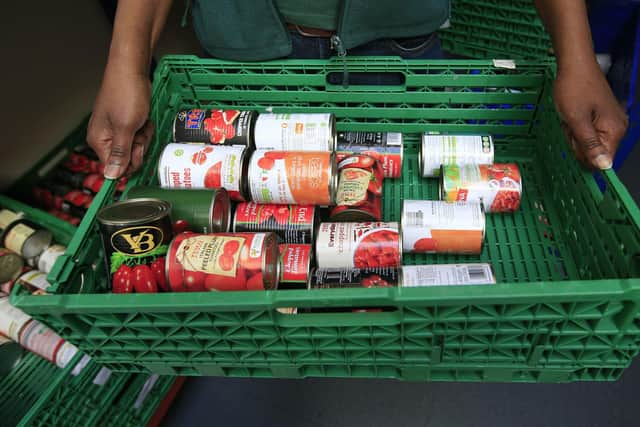A new approach to feeding Yorkshire's children as food bank usage soars: Bob Doherty and Philip Hadley
In addition, there are a growing number of more informal emergency food aid centres operating outside of national networks (food pantries, social supermarkets and soup kitchens), which takes the number up to 2,811. This is higher than the number of Sainsbury’s, Morrison’s and Asda stores put together.
The demand for emergency food aid has risen by 37 per cent in the past 12-months, compared to the peak of the pandemic 2021-2022. While these food aid organisations offer essential food to those in need, providers themselves, such as the Trussell Trust, call for an end to the need for food banks.
Advertisement
Hide AdAdvertisement
Hide AdLast year, members of the Independent Food Aid Network (IFAN), the second largest network of food banks in the UK, along with the Trussell Trust and charity Feeding Britain, wrote to the then Prime Minister to express their “deep concern about the scale of suffering…as well as our capacity to prevent people from going hungry”. Their concern was sadly proven right, as recent survey-based research by the Joseph Rowntree Foundation revealed that in December 2022, 7.2 million households in the bottom 40 percent of incomes (62 per cent) reported that they were going without essentials.


Fuelled by the Covid-19 pandemic and a crisis in the cost-of-living, food banks are now severely struggling with a surge in demand and a drop in food donations. While it is now well-established that the primary driver for food bank need is poverty and destitution, mediated by an inadequate social security system, the rise in food banks is also linked with a wider food system that is unfit for purpose.
It is crucial that the social security system, at a minimum, protects people from going without essentials, as called for by the Trussell Trust, JRF, IFAN and others in a new campaign for an Essentials Guarantee. This is also a time to think about how we can redistribute resources in the food system, and create policies to achieve it.
Food production supplying UK diets is unsustainable, with Public Health England reporting that poor diets high in fat, sugar and salt foods result in one in seven deaths every year, and cost the economy £27 billion per year, with children’s dietary intake consistently failing to meet recommendations.
Advertisement
Hide AdAdvertisement
Hide AdPoor dietary health is also linked with food poverty, as national survey data from the Food Foundation reveals that food insecure households are more likely to be cutting back on buying healthy foods, such as fruit, vegetables and fish.
In our research project, Fix our Food, we at the University of York and colleagues at partner institutions are working with multiple stakeholders across Yorkshire to imagine and trial new ways of bringing food from farm to fork, premised on the need to transform the UK’s food system, by placing healthy people and a healthy environment at its core. We work with networks of innovative farmers who are trialling regenerative agricultural practices, as well as new hybrid business models, such as social enterprise Food Circle, aimed at improving social and environmental impact, and our work in schools.
Our work with schools, including those in areas of disadvantage, aims to reduce inequalities in diet quality, and to catalyse dietary change more widely. Many areas in Yorkshire show some of the worst income deprivation statistics affecting children in England, while government survey data reveals that free school meal eligibility (and food bank usage) is fundamentally linked with household food insecurity and income. At the same time, schools and early years settings can play a key role in generating change in the food system, as children are powerful drivers of change.
In our work with primary schools in Sheffield, we found that many families were eligible for free school meals, but did not apply, due to perceptions of stigma, as well as confusion over the process. We worked to establish auto-enrolment, where the school receives a premium for providing free school meals, and parents receive a letter notifying them of their eligibility. We have also called for the extension of free school meals to all primary schoolchildren.
Advertisement
Hide AdAdvertisement
Hide AdAs with challenges faced by food banks, there is an urgent need to take a wider approach to understand and address an unsustainable food system. We are mapping primary school food provision and consumption across Yorkshire, and working collaboratively (and co-creatively, with children) to embed, test and evaluate new ways of doing things. This includes linking school food procurement with regenerative farming and new business models, as well as adapting food education and the food environment in schools. Together with much-needed policy change, our research is revealing critical pathways to transform the food system. Without such change, food banks are set to become the ‘new normal’ in communities, together with ever-rising food insecurity.
Professor Bob Doherty and research associate Philip Hadley are from the University of York’s School for Business and Society,